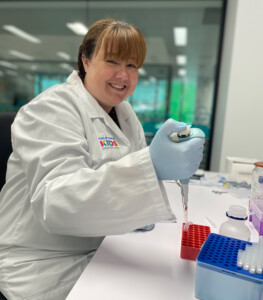Our 2022 Research Project Grant recipient, Bree Foley, is making exciting progress towards a faster, more effective, and kinder treatment option for children and people with leukemia.

Bree’s team at Telethon Kids Institute are in the midst of first-of-its-kind research, uncovering what makes certain cells effective at killing cancer. This research will be a huge stride towards our vision of a cancer free future.
Bree has a passion for science and immunology and wishes there was more funding available, so she could pursue more research.
“Good research is not getting through, because there’s not enough money”, Bree emphasised.
“We want a cancer free future. It might take a while, but everything that we do now is going to make a difference for future generations.”
Anything that we can do to make it a little bit easier for these kids who are diagnosed with cancer - it’s all worthwhile.
Bree’s current cancer research project
The cells that Bree’s team are investigating are called natural killer (NK) cells. NK cells are in all of us and are capable of killing cancer cells. Some people have superior NK cells, which when tested were found to be more effective at killing different types of leukemia.
Researchers have long known that some NK cells fight cancer, without understanding exactly what makes certain NK cells more potent than others. Bree’s research is a first look at what makes some NK cells more superior – and therefore more effective at killing cancer cells – than others.
“If we can get a recipe for what makes a good NK cell, we can make more good ones and do an adoptive cell therapy for people with cancer, and in particular, leukemia”, shared Bree.
The impact of Bree’s cancer research for the WA community
With knowledge about what makes a superior NK cell so effective, will come the ability to prepare superior NK cells ahead of time. This is unlike current cell therapies in the clinic that rely on using a patient’s own immune cells, which can take up to two months to prepare. With Bree’s approach, superior NK cells will be ready to transfer into the patient whenever required.
“Although the current treatments for leukemia are really effective, by introducing new less toxic therapies, we can lower the amount of these current therapies needed by kids with leukaemia and still cure them giving them a much better quality of life”, Bree said.
This research will not only benefit children with leukemia, but will also pave the way for a new treatment method for other kinds of cancer.
At Cancer Council WA we fund researchers throughout their whole research journey, which includes a focus on early career researchers. We believe that by investing in young WA researchers, we can keep talented researchers in WA.
We want our research to be kept here in WA, to directly help patients in WA.
Timeline of Bree’s cancer research
Bree hopes to see her research result in a clinical trial in five years’ time.
“It can take a while for what we’re looking at in the lab to end up in the clinic, but if everything goes really well, I think there’s potential for us to get to a clinical trial in five years”, said Bree.
“Research can sometimes seem like a lot of people working on tiny things, but together we’re making a real difference.”
How you can help cancer research
Our research program is entirely donor funded, meaning Bree’s research so far has been made possible by people like you, making generous donations. Bree needs your support to continue this ground-breaking research.
“We would not be able to do what we do without funding from Cancer Council WA.”
“You might think our research won’t affect you directly, but you never know what our discoveries could mean for you in the future.”
“It might not be you, but if could be someone you love, or your grandchildren or future generations that will benefit from the research we are doing now.”
“Everyone benefits from a healthier community”, says Bree.
A message from Bree to our donors
“We are so appreciative of those who donate to fund our research. I wish we could do more to thank you.
Without your support, we wouldn’t be able to do the research we’re doing.
Even just a little bit goes such a long way, so thank you!” says Bree.
Find out more
- Find out more about our funding opportunities
- Donate to our cancer research projects